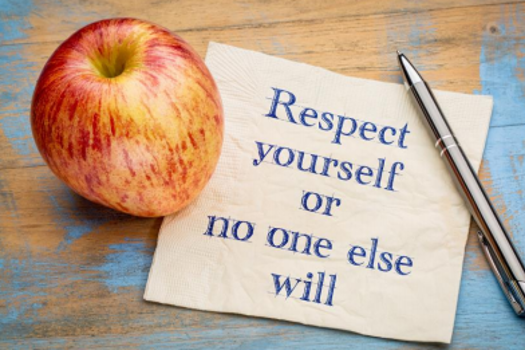
Building Mental Strength is dedicated to equipping you with essential tools for effectively managing emotions, fostering a positive mindset, and cultivating resilience in the face of life’s challenges. We’ll provide you with resources and guidance to enhance your emotional well-being, helping you learn how to cope with adversity and thrive in the process. Get ready to unlock your inner potential and embark on a path of self-discovery and growth as we support you in building the mental strength needed for a more resilient and optimistic future.

Having a healthy sense of self is the foundation for living your best life. But what exactly does this mean? It’s a combination of the way you see yourself, your experiences, environmental influences, and your self-esteem. Many of us go through life without giving our identity much thought, but nurturing a strong sense of self is important. It’s vital to allocate some time to explore what it is and how to build a clear and empowering self-image.
Try Something New
Enhance Your Space.
In our quest for improved mental well-being, we often overlook the impact of our living and working spaces. Yet, even small changes can make a space more joyful and significantly boost our overall happiness. So what changes can you make to enhance your surroundings?

Declutter and organize. A clutter-free and well-organized environment can work wonders for your mental tranquility. Clutter not only breeds stress and anxiety but also scatters your focus and impairs memory. By simplifying your space, you can create a more spacious and serene atmosphere.
Inject a Splash of Color. When it comes to colour, you may have heard statements like “blue is the colour of productivity” or “yellow creates energy”. Disregard the notion that certain colours are tied to results. Instead, opt for colours that resonate with you, colours that evoke joy, tranquility, or invigoration, depending on your personal preferences. Don’t limit your palette to paint alone; consider infusing colour through details like artwork, cushions, and decorative accents.
Embrace the Natural World. Infuse the calming essence of nature into your space by incorporating a neutral colour scheme, indoor plants (even artificial ones if natural light is limited), or introducing natural scents through candles or incense.
Tackle One Space at a Time. To prevent overwhelm, approach your home transformation room by room, starting with the one that serves your immediate needs best. Whether it’s your home office for remote work, the bustling hub of the kitchen, or simply your favourite sanctuary within your home, a systematic approach ensures your space aligns with your lifestyle.

Try Something New
When life doesn’t go to plan, we often encounter a cascade of emotions – overwhelm, worry, uncertainty, and, at times, even panic. If we don’t step in and focus our thoughts to regain control, it’s all too easy to spiral downward. During these times of uncertainty, our brains are subconsciously looking for familiarity and comfort. Something that it recognizes, so it can say: “Ok… maybe it’s not as bad as I thought.”

Give your brain the reassurance it needs by choosing three or four must-do activities. These become your anchors of normality, daily or weekly habits. Whether it’s your yoga practice, a morning shower, or the candle you light when dinner cleanup is done, these are actions that ground you in the familiar. In times when your daily rhythm undergoes shifts – such as transitioning to a work-from-home setup or when the kids leave for school, leaving your home unusually quiet – your anchors of normality serve as pillars of familiarity as you work through what’s new and the accompanying emotions.

Emotional health is an important part of your mental wellness and your overall well-being. It’s important to note that being emotionally healthy doesn’t mean you’re happy all the time. Instead, it signifies that you are in control of your thoughts, feelings, and the behaviours that accompany them. Equipping yourself with effective coping strategies to navigate challenges and manage negative emotions empowers you to bounce back from setbacks. Moreover, it fosters the development of positive relationships, both with yourself and with others.
Try Something New!
Press Your Reset Button
When life reaches a point of overwhelming stress, leaving you imbalanced and possibly physically unwell, it’s time to reset. The most accessible way to achieve this is by reconnecting with your breath. Consider trying the heart-brain coherence practice, a simple technique that takes just a few minutes to calm your brainwaves. Here’s how you do it:

- Place your hands gently over your heart. If you’re wearing a necklace or something that aligns with the center of your chest, it can serve as a focal point for your attention.
- Slow your breathing, extending both your inhalations and exhalations, effectively halving your usual breathing pace. Picture yourself inhaling not into your lungs, but directly into your heart.
- As your heart and breath synchronize, think of something that elicits gratitude – a loved one, a cherished place, or a favorite activity. Linger in this state for as long as you desire.
This practice can serve as a reset button to restore inner harmony when life’s challenges become too much to bear.

The individuals in your life significantly influence your overall health and well-being. Understanding how to cultivate and maintain these relationships ensures that we balance the benefits of our social network while still caring for our personal needs. Setting healthy boundaries and communicating effectively are paramount for nurturing and sustaining the relationships that enrich our life.
Try Something New!
Crafting Your Support Network Eco Map
When life feels tough, it’s helpful to have people you know you can depend on for support. Prepare for those moments by creating an eco map or visual representation of your support network. Begin by placing yourself at the centre of this map, then branch out to include family members, friends, co-workers, and other individuals and groups that you can connect with when needed. When your mental and emotional well-being feels off-balance, consult your eco map to identify who you can reach out to. Depending on the circumstances, whose presence would bring you joy or offer the support you require at that moment? Your eco map can also serve as a reminder of those who may benefit from your support.























